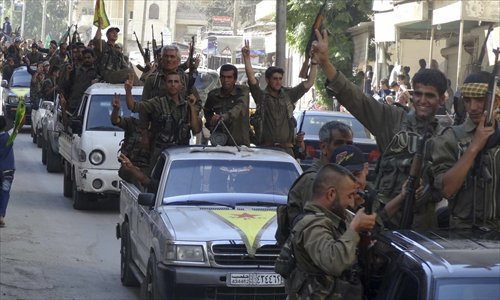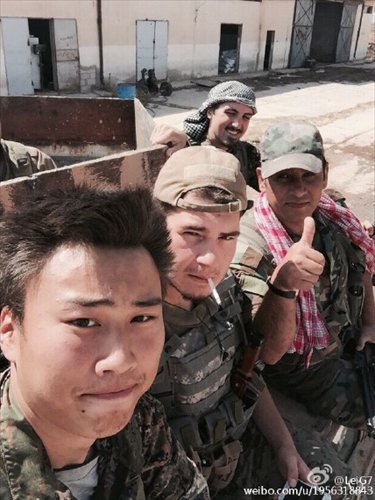HOME >> WORLD
Making a difference
Source:Global Times Published: 2015-6-5 0:08:02
Chinese Net users take note of a British-Chinese fighting IS in Syria

YPG members wave during a military parade in the Kurdish town of Efriny. Photo: CFP
Staring at the bullet holes on the wall, Huang Lei felt scared over the thought of being killed once he got onto the battlefield.
Despite receiving live-fire training when he served in the British Royal Army, Huang said firing at a real person was totally different. He added his mind went blank when he first fired at terrorists during a night encounter.
"I'm not a hero and I don't want to be one. But I am proud to fight Islamic State jihadists with soldiers from around the world," said Huang to Global Watch, a portal where journalists and experts post articles.
The 23-year-old British-Chinese is one of hundreds of international fighters helping Kurdish forces engage the Islamic State in Iraq and al-Sham (ISIS) in northern Syria, near the border of Turkey.
Born in Southwest China's Sichuan Province, Huang moved to Britain when he was young and later studied at the University of Manchester. He joined the fight with the Kurds in March. "I saw a Kurdish woman strapped with explosives run to IS militants to save her homeland," said Huang.
Having been stationed in Al-Hasakah for three months, Huang barely slept as the silence was frequently disrupted by explosions and gun and mortar fire every night. After urban residents flee, the fighters find a place to spend a day or two. On the frontline, the only food they could find was flatbread,Huang was quoted by media as saying.
"I was crying as I ate," Huang said. "We tried to toast the bread but it was too hard, so we had to dip it in water."

Huang Lei (left) Photo: Sina Weibo
Not alone
The volunteers fight alongside the People Protection Unit or YPG, a Kurdish militia group in northern Syria, who are former military troops but have little combat experience. Some were painters or teachers before joining the army, reports said.
For security reasons and to maintain loyalty within the group, each of the volunteers was given a Kurdish name with the word Heval, which means friend in Kurdish.
Those fighters are given food but no salary and have to find their own place to sleep at night. Since few Kurdish fighters speak English, the international fighters are assigned in separate groups.
Usually the volunteers have two military uniforms, one rifle and a spare bullet clip. Huang is armed with an AK-47 and an SVD sniper rifle. But he said, "IS militants are better armed." For example, IS militants in Syria are armed with M79 90mm anti-tank rockets and US-manufactured small arms, according to the Conflict Armament Research.
It is not known how many international freedom fighters have joined Syrian Kurdish forces. But they are fewer than those who have joined ISIS, reports said.
Grabbing attention
Huang was a sniper as well as a medic. He explained there aren't enough medical staff to attend to wounded soldiers.
"Remember, be positive and good things will happen. Never give up," Huang posted on his Weibo account to comfort thousands of his followers.
Huang's Weibo photos showing his life in the battlefield have attracted nearly 90,000 followers so far.
One photo shows him and other soldiers celebrating a victory in one battle, with messages from followers telling him to stay safe. "Those pictures were taken following our recent encounters. Thanks for your support, I'm good. Once I have time I will update my Weibo," his reply reads.
Many Net users left messages for Huang asking about how to volunteer, how many terrorists he shot, and why he doesn't have better equipment.
Huang said that he got in touch with the international fighters organization through social media. "They contacted me and picked me up at the airport," he told the media.
The foreign fighters' journey to Syria has already attracted much attention from "The Lions of Rojava," a Facebook page set up in October, run by American fighter Jordan Matson. The page asks foreigners to join the fight against IS.
"Welcome to our family, brothers and sisters. Join YPG, the Lions of Rojava Unit and send ISIS terrorists to hell and save humanity," the page writes.
Worldwide concerns
The UN Security Council said it is concerned many countries have failed to prevent their citizens from joining IS. Over 25,000 foreigners from more than 100 countries have links with terrorist groups, a UN agency said.
Western governments act differently toward those joining ISIS or those linking up with the Kurdish resistance whose motives are far more diverse, Reuters reported.
British Prime Minister David Cameron has made it clear there is a fundamental difference between fighting for the Kurds and ISIS. British law stipulates fighting in a foreign war is not automatically an offense and depends on circumstances, the report added.
Two British military veterans, Jamie Read and James Hughes, who were fighting along with the Syrian Kurdish, returned to the UK and no action was taken against them.
Huang said he decided to join the fight against militants because he wanted to do something meaningful. "I was not particularly interested in international affairs, but I have become a soldier to try to protect others."
"Joining the fight against militants is commendable but we advise against all travel to Syria and Iraq," Han Bing, an official at the Chinese Embassy in Syria, told the Global Times.
The Chinese government said it discourages Chinese citizens from going to Syria because the current situation is unpredictable, Han explained.
"War is not as easy as holding up a gun. It's totally different from what you think," said Han.
Posted in: Mid-East